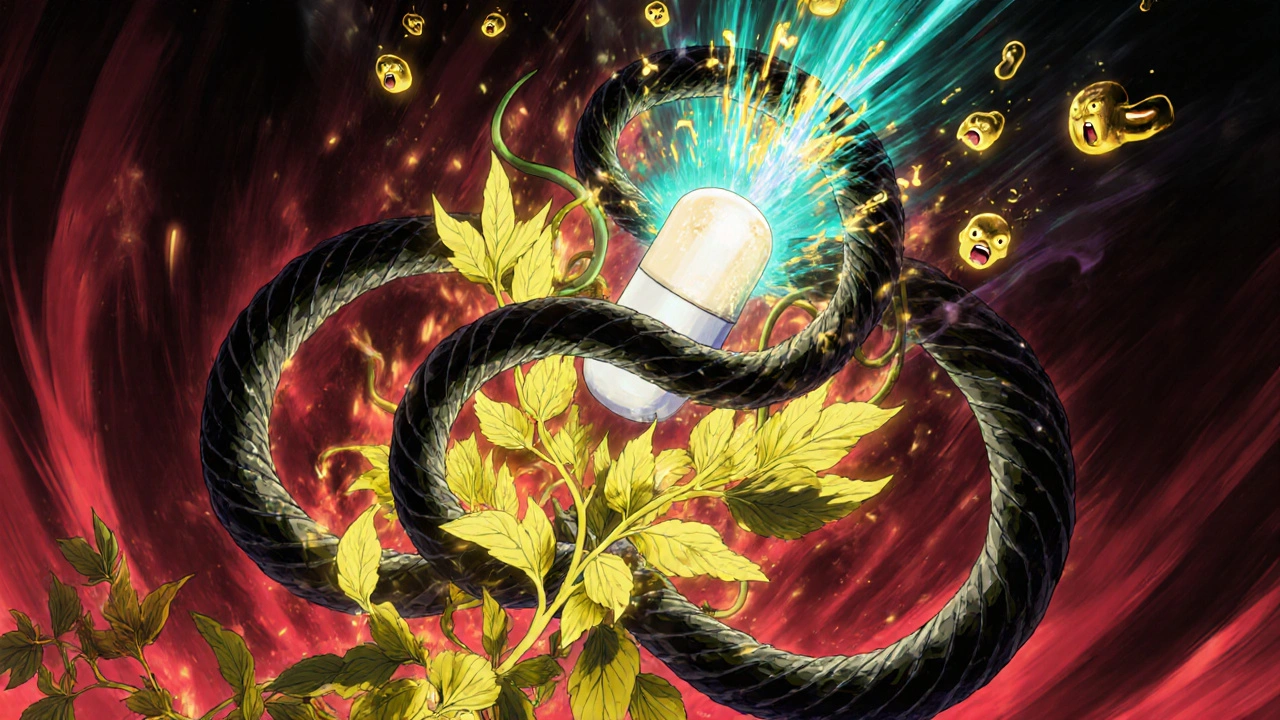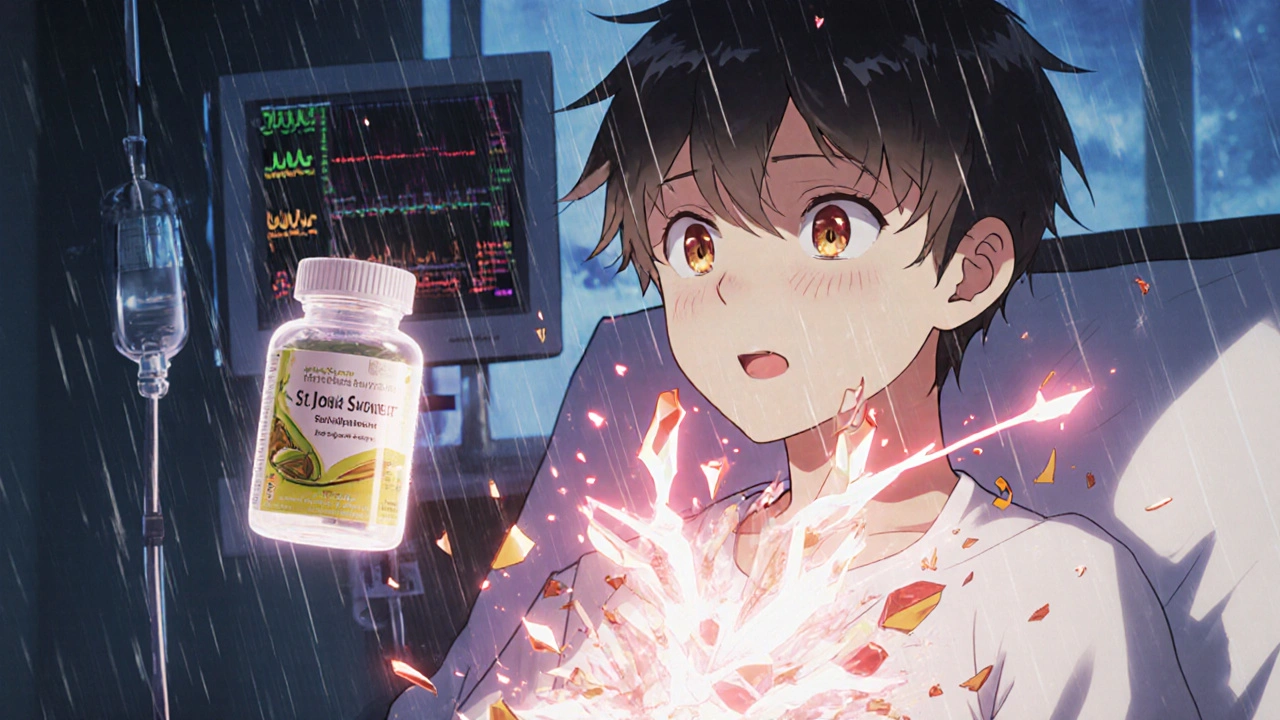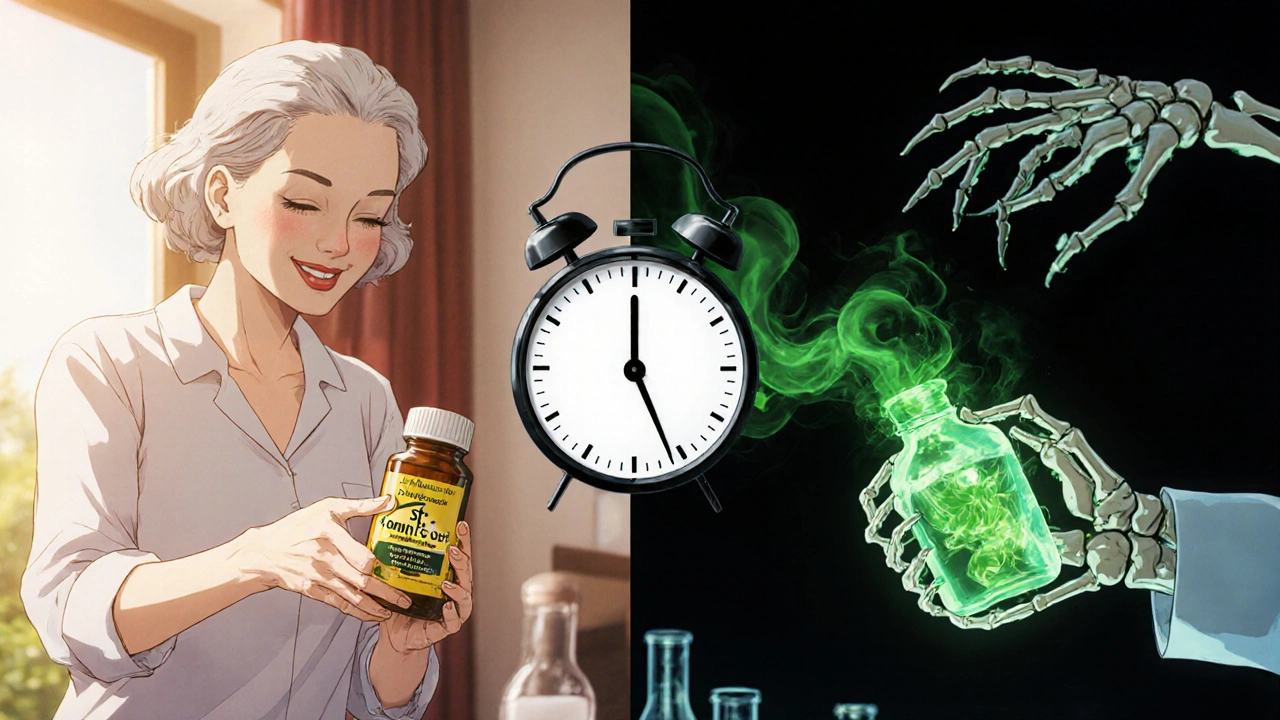St. John’s Wort and SSRIs: The Hidden Danger of Serotonin Syndrome

People take St. John’s Wort because they want something natural. It’s sold in health food stores, pharmacies, and online. No prescription needed. Many believe it’s safer than antidepressants. But here’s the truth: combining it with SSRIs isn’t just risky-it can be deadly. And most people don’t know it.
What Is St. John’s Wort?
St. John’s Wort (Hypericum perforatum) is a yellow-flowered plant used for centuries in Europe to treat low mood. Today, it’s marketed as a natural remedy for mild to moderate depression. In Germany, it was once prescribed like a drug. In the U.S., it’s sold as a dietary supplement-meaning the FDA doesn’t test it for safety or effectiveness before it hits shelves.
Standardized supplements usually contain 0.3% hypericin and are taken at 300 mg three times a day. That’s 900 mg total. But potency varies wildly between brands. One bottle might have strong active ingredients. Another might be barely effective. And no one’s checking.
What makes it dangerous isn’t just what it does-it’s what it does to other drugs.
How St. John’s Wort Interacts with SSRIs
SSRIs-like sertraline, escitalopram, and fluoxetine-are the most common antidepressants prescribed today. They work by increasing serotonin in the brain. That’s good, if you’re depressed. But too much serotonin? That’s serotonin syndrome.
St. John’s Wort doesn’t just add to serotonin levels. It does two things at once:
- It blocks serotonin reuptake-just like SSRIs.
- It triggers liver enzymes (CYP3A4, CYP2C19) that break down SSRIs faster.
The second part sounds like it should help-faster metabolism means less drug in your system, right? Wrong. When the body breaks down SSRIs too quickly, people often take more. Then, when they stop the herb, the SSRI builds up again. That spike in serotonin is what triggers the syndrome.
And here’s the kicker: even if you take them at different times of day, it doesn’t matter. The enzyme changes last for days. The serotonin effect is additive. There’s no safe window.
Serotonin Syndrome: What It Looks Like
Serotonin syndrome isn’t rare. It’s underreported. People go to the ER with shaking, sweating, confusion-and no one asks about the herbal supplement they took.
Symptoms can show up in as little as 24 hours after mixing St. John’s Wort and an SSRI. They range from mild to deadly:
- Mild: Shivering, sweating, nausea, restlessness, diarrhea
- Moderate: Muscle twitching, high blood pressure, rapid heartbeat, confusion
- Severe: Fever over 106°F, seizures, muscle breakdown (rhabdomyolysis), kidney failure, death
Doctors use the Hunter Criteria to diagnose it: you need at least three of these symptoms-mental changes, agitation, tremor, hyperreflexia, sweating, shivering, or high fever. In 17 documented cases reviewed by the European Psychiatric Association in 2025, every severe case involved sertraline or paroxetine. But that doesn’t mean other SSRIs are safe.
One 1998 case in the American Family Physician journal described a patient who became unresponsive, confused, and trembled after taking paroxetine and St. John’s Wort together. He didn’t die-but he came close.

Why People Don’t Realize the Risk
“It’s natural,” they say. “My grandma used it.”
That’s the biggest problem. People assume herbal means harmless. A 2021 study in JAMA Internal Medicine found that only 32.7% of people who took herbal supplements told their doctor. Not because they were hiding it-because they didn’t think it mattered.
Doctors don’t always ask, either. Most don’t screen for herbal use unless the patient brings it up. And even then, many aren’t trained on the interactions.
St. John’s Wort doesn’t just affect SSRIs. It messes with birth control, blood thinners, HIV meds, epilepsy drugs, and even immunosuppressants after organ transplants. One study showed it cuts cyclosporine levels by 60%. That means transplant patients could reject their new organs.
And it’s not just a one-time thing. It takes two weeks for the liver enzymes to return to normal after stopping St. John’s Wort. So if you quit the herb and start an SSRI right away, you’re still at risk.
What Experts Say
The American Psychiatric Association says it plainly: St. John’s Wort and SSRIs should never be used together.
The European Medicines Agency bans it entirely with any serotonergic drug. The Mayo Clinic warns it “might raise the risk of a buildup of high serotonin levels.” The Cleveland Clinic says the risks “significantly outweigh any potential benefits.”
The FDA has issued 12 safety alerts on St. John’s Wort since 2018. In 2024, they proposed new labeling rules requiring clear warnings about interactions with antidepressants. Canada already made it prescription-only in 2023 after 17 serotonin syndrome cases were reported.
And yet-sales in the U.S. hit $156 million in 2022. Over 12% of American adults use it. Most think it’s fine. They’re wrong.

What You Should Do
If you’re taking an SSRI:
- Stop taking St. John’s Wort immediately.
- Don’t restart it without talking to your doctor.
- Tell your doctor if you’ve used it in the last two weeks.
- Don’t assume “natural” means safe.
If you’re thinking about starting St. John’s Wort:
- Don’t take it if you’re on any antidepressant.
- Don’t take it if you’ve taken an SSRI in the last two weeks.
- Ask your doctor about proven alternatives-therapy, exercise, or FDA-approved medications.
There’s no safe dose of St. John’s Wort when combined with SSRIs. Not 100 mg. Not 300 mg. Not even one capsule. The interaction is biological, not dose-dependent.
What About Other Herbal Options?
Some people turn to omega-3s, saffron, or SAM-e for mood support. Saffron has shown promise in studies for mild depression, and it doesn’t trigger serotonin syndrome. Omega-3s may help with inflammation linked to depression. SAM-e is a supplement that affects serotonin-but it’s still risky with SSRIs. No herbal remedy is completely safe if you’re on medication.
There’s no shortcut. If you need help with depression, talk to a professional. There are effective, tested treatments that won’t kill you.
What’s Next?
Researchers are looking at hyperforin-free versions of St. John’s Wort-trying to keep the mood-lifting effect without the dangerous enzyme changes. But those aren’t on the market yet. Until then, the only safe choice is avoidance.
The science is clear. The warnings are loud. The deaths have happened.
Don’t gamble with your brain. Don’t trust marketing. Don’t assume your doctor knows what you’re taking.
If you’re on an SSRI-skip the herb. Your life depends on it.
Can I take St. John’s Wort with any antidepressant?
No. St. John’s Wort interacts with all antidepressants that affect serotonin, including SSRIs, SNRIs, MAOIs, and even tricyclics. The risk of serotonin syndrome is real and potentially fatal. There is no safe combination.
How long should I wait after stopping St. John’s Wort before starting an SSRI?
Wait at least two weeks. The liver enzymes triggered by St. John’s Wort can stay active for days after you stop taking it. Starting an SSRI too soon can cause serotonin to build up dangerously. Always check with your doctor before switching.
Is St. John’s Wort safer than prescription antidepressants?
No. While it may seem safer because it’s “natural,” it’s not regulated like a drug. Its potency varies, and it causes dangerous interactions with many medications. Prescription antidepressants have known dosing, side effects, and safety profiles. St. John’s Wort does not.
Can St. John’s Wort cause serotonin syndrome on its own?
Yes, though it’s rare. High doses of St. John’s Wort alone-especially over 900 mg daily-can raise serotonin enough to trigger symptoms. But the risk jumps dramatically when combined with other serotonergic drugs like SSRIs.
What should I do if I think I have serotonin syndrome?
Seek emergency medical help immediately. Symptoms like high fever, seizures, confusion, or rapid heartbeat are medical emergencies. Tell the staff exactly what you’ve taken-herbs, supplements, and prescriptions. Early treatment saves lives.
Does St. John’s Wort interact with birth control?
Yes. It increases the breakdown of hormones in birth control pills, patches, and rings. Studies show this can lead to unplanned pregnancies at rates of nearly 4 per 100 women per year. Don’t rely on hormonal birth control if you’re taking St. John’s Wort.
Are there any safe herbal alternatives for depression?
Saffron has shown promise in clinical trials for mild depression without dangerous interactions. Omega-3 fatty acids may also help, especially with inflammation-linked mood symptoms. But none are proven replacements for prescribed treatment. Always talk to your doctor before trying anything new.
Joe Durham
November 20, 2025 AT 07:09I used to take St. John’s Wort for my anxiety-thought it was harmless since it’s herbal. Didn’t realize I was playing Russian roulette with my brain until my doctor caught it. I was on sertraline and didn’t tell him about the supplement. He looked at me like I’d just admitted to juggling chainsaws. Never again. Natural doesn’t mean safe. Period.
Now I stick to therapy and walking my dog. Two things that actually help without trying to kill me.
Derron Vanderpoel
November 20, 2025 AT 07:33OMG I JUST TOOK THIS FOR 6 MONTHS WHILE ON ESCITALOPRAM AND I’M STILL ALIVE???!?!?!?!?!?!? I thought i was just ‘sensitive’ to meds… my heart would race at 3am like a jackhammer and i’d feel like i was melting inside. i thought it was stress. turns out i was one capsule away from the ER. THANK YOU FOR THIS POST. I’M TELLING EVERYONE.
Christopher K
November 22, 2025 AT 05:24Oh wow, another anti-herb crusade from the pharmaceutical lobby. Let me guess-next you’ll tell us aspirin is dangerous because it’s ‘not natural’? You people are terrified of anything that doesn’t come with a patent. People have used this herb for centuries. The FDA doesn’t regulate it because it can’t be monopolized. That’s not a flaw-it’s a feature.
Meanwhile, SSRIs have a 40% failure rate and turn people into emotional zombies. But sure, let’s scare folks with ‘serotonin syndrome’ like it’s some new invention. I’d rather take my chances with a plant than a chem lab in a pill.
river weiss
November 23, 2025 AT 10:46Thank you for this comprehensive, evidence-based breakdown. The key takeaway-beyond the obvious danger-is the systemic failure of healthcare communication. Patients assume herbal supplements are benign; clinicians assume patients aren’t taking them. Neither side asks. Neither side listens. The result? A preventable public health blind spot.
St. John’s Wort is not the villain-it’s a symptom. The real issue is the lack of regulation, education, and integration of complementary therapies into clinical practice. We need mandatory supplement disclosure forms in electronic health records, provider training on herb-drug interactions, and public awareness campaigns that don’t rely on fear-but on clarity.
And yes: if you’re on an SSRI, stop the herb. Immediately. And tell your doctor. Then ask them why they didn’t ask you first.
Brian Rono
November 23, 2025 AT 21:28Let’s be real: this isn’t about safety-it’s about control. The pharmaceutical industry doesn’t want you taking a $12 bottle of herbal tea when they can sell you a $150/month prescription with a 12-page warning label. Serotonin syndrome? Sure, it exists. But so does liver failure from acetaminophen, heart attacks from NSAIDs, and death from penicillin allergies. We don’t ban those. We educate. But herbs? Oh no, they’re the boogeyman.
Also, ‘natural’ doesn’t mean ‘safe’? Then why does every organic juice bar sell you kale smoothies with 12 different botanical extracts that interact with every medication you’ve ever taken? Hypocrisy is the only consistent ingredient here.
seamus moginie
November 25, 2025 AT 13:58My mum took St. John’s Wort for years after Dad died. She said it helped her sleep and stopped the crying spells. She never told her GP because she didn’t want to be ‘a bother.’ Then she started on sertraline after a fall and ended up in the hospital with a fever of 105. She’s fine now, but the scare changed her. She says she’ll never take anything without checking with someone who knows what they’re talking about.
It’s not about hating herbs. It’s about respecting the power they have. Just because it grows in the ground doesn’t mean it’s harmless. We need better dialogue-not more fear.
Dana Dolan
November 25, 2025 AT 22:51Wait so if I stopped the herb 3 weeks ago, can I start an SSRI now? Or do I wait longer? I’m scared to ask my doctor because I feel dumb for not knowing this sooner. Also, what if I took it for 2 months but never combined it with meds? Is my liver still messed up?
Zac Gray
November 27, 2025 AT 03:23Let me guess-you’re the kind of person who thinks ‘natural’ means ‘FDA-approved.’ Funny how you’ll take a vitamin D pill from a billion-dollar corporation but freak out about a plant that’s been used since the Middle Ages.
Look, I get it. You’re scared. But the real danger isn’t the herb-it’s the culture of fear-mongering that makes people distrust their own bodies. You want to feel better? Try therapy. Try sunlight. Try talking to someone. But don’t pretend that your fear of a plant is somehow ‘science.’ It’s just marketing dressed up like medicine.
And if you’re really worried about serotonin syndrome, maybe stop taking five different supplements that all raise serotonin and call it a day. But no, let’s blame the herb because it’s cheaper than admitting your regimen is a dumpster fire.
Steve and Charlie Maidment
November 28, 2025 AT 01:43So you’re saying I shouldn’t take St. John’s Wort with my Lexapro? But I’ve been doing it for 18 months and I feel great. I’ve never had any symptoms. So why should I stop? You’re just trying to scare people so they’ll buy more pills. My grandma used it. My uncle used it. My dog even licked it once and didn’t die. Maybe the real problem is you don’t understand how the body works.
Also, why are you so obsessed with this one herb? What about turmeric? Ginger? Green tea? They all interact with meds too. But you’re not writing a 2000-word essay about them. Why? Because they’re not profitable. This isn’t about safety. It’s about profit.
Michael Petesch
November 29, 2025 AT 13:31In Japan, Kampo medicine-a system of herbal remedies-has been integrated into national healthcare for over a century. Practitioners are trained in herb-drug interactions and prescribe them alongside conventional treatments. Why is the U.S. so far behind? Because we treat supplements as commodities, not medicine. We don’t regulate them because we don’t take them seriously.
But the science is clear: St. John’s Wort alters cytochrome P450 enzymes with clinical significance. This isn’t folklore. It’s pharmacokinetics. And ignoring it doesn’t make it go away.
The solution isn’t to ban herbs. It’s to regulate them. To train doctors. To educate patients. To treat natural products with the same rigor we treat synthetic ones. Until then, yes-avoid combining them with SSRIs. But also demand better systems. Because people deserve both safety and autonomy.